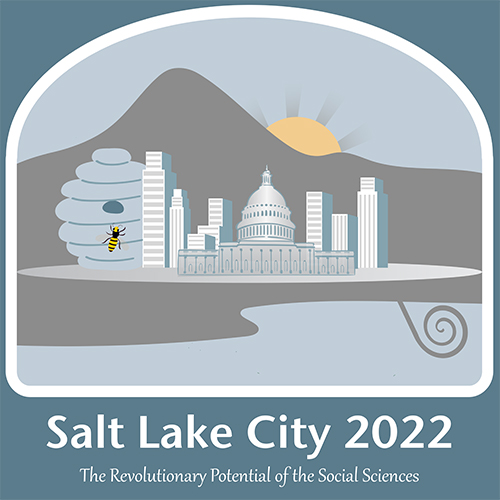An account is required to join the Society, renew annual memberships online, register for the Annual Meeting, and access the journals Practicing Anthropology and Human Organization
- Hello Guest!|Log In | Register
2022 Program Chair’s Column
James H. McDonald
 The 2022 SfAA annual meeting in Salt Lake City is now squarely in the rearview mirror. It was incredibly good to return to an in-person meeting format, bolstered by our hybrid option for those who were not able to join us.
The 2022 SfAA annual meeting in Salt Lake City is now squarely in the rearview mirror. It was incredibly good to return to an in-person meeting format, bolstered by our hybrid option for those who were not able to join us.
Here are a few reflections from the meeting:
-
The 9:00am-5:30pm schedule was a real plus and less exhausting than kicking things off at 8:00 and closing out well into the evening.
-
TIG, co-sponsors, and program committee members did an outstanding job helping us craft one of the more topically diverse conferences at least in recent memory. It was also good to see a strong set of sessions focusing on professional development.
-
We had a good mix of workshops (seven in total with only one cancellation).
-
We had some very welcomed new co-sponsors in the Society for Ethnobiology and our European counterparts (the applied wing of the European Association of Social Anthropologists).
-
The most work: It was easily putting together the schedule. That is a little akin to playing three-dimensional chess. The strategy was to schedule thematically or topically related sessions in the same room in sequence to reduce possible overlap with directly relevant and competing sessions. It also makes it easier to locate related sessions.
-
The most fun: It was easily visiting with regional anthropology departments in late August and early September to get the word out about the conference and recruit papers and sessions. I was reminded about how fantastic our colleagues are and how distantly scattered they are across the Intermountain West. A quick thumbnail calculation came in at 1,737 miles of scenic driving from as far north as Pocatello, ID to as far south as Flagstaff, AZ.
I also thought that the hybrid portion of the meeting went far more smoothly than I would have suspected. The hybrid format was, undoubtedly, our biggest challenge. It’s one thing to do an in-person conference; another to do a fully on-line conference; and something else altogether to combine the two at once. While the hybrid format is considerably more work (with occasional heart-stopping moments), I would strongly advocate that we continue to develop and refine this conference format. Clearly, we had a constituency that wanted to participate but could not attend the live meeting for a wide variety of reasons. If we are serious as a society about expanding our international colleagues, a hybrid format is also critical. It might be argued that we should hold not one, but two conferences per year: one in-person and the other virtual. I believe that our colleagues at the AAA are seriously considering this option. My concern is that we could do not have the demographic scale to support two distinctly formatted conferences. We also found that a number of participants had to cancel their travel plans just prior to the conference but still wanted to participate. We simply zoomed them into their live session. The conclusion I came to is that the world and peoples’ lives are often complicated and contingent. A hybrid format—while not necessarily a perfectly distilled ideal—is able to accommodate the majority of those complications and contingencies.
In closing, I’d like to thank the hard-working staff at the SfAA: Executive Director Neil Hann; Annual Meeting and Awards Coordinator Don Stull; Office Manager Trish Colvin; Annual Meeting Program Administrator Melissa Cope; TIG and Co-sponsors; 2022 Program Committee; SfAA Officers and Board; SfAA Conference Working Group; SfAA Podcast Team that doubled as much-needed tech help; and a small army of student volunteers. I’d also like to give a special shout out to Dr. Elaine Bennett who served as the Associate Chair overseeing the hybrid portion of the conference. Elaine served in that capacity while transitioning into a demanding dean position at St. Vincent College. I am not sure how she did it, but she kept her sense of humor and did an amazing job of guiding us through the challenges of the hybrid format.
As you can see, the conference relies on an amazing and diverse team. They all have my deepest thanks for helping us bring the conference to fruition in the shadow of Utah’s Wasatch Front.

Cart
Search